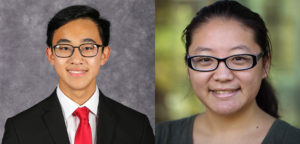
There are 206 first-generation students that are graduating in the class of 2019 this year. Kevin Ly, ’19, (left) and Sydney Yang, ’19, co-founded the First-Generation Initiative Represented by Students and Teachers, a club that creates a resourceful community for first-generation students on campus. (Courtesy of Kevin Ly and Sydney Yang)
There will be 206 students who identify as first generation who will walk at commencement on May 20, according to George White, managing director for Student Success and Access.
Two of these students were co-founders of the First-Generation Initiative Represented by Students and Teachers, or F1RST, a club founded to provide resources, connect and build a community for first-generation students.
When Kevin Ly, ’19 and Sydney Yang, ’19, first stepped onto Lehigh’s campus, they said they thought there weren’t a lot of helpful resources to help them adjust to college as first-generation students, people who are first in their family to attend college.
Lehigh University Student Scholars Institute, a program aimed toward supporting first-generation and low-income students, was “relatively small” when the seniors arrived in fall 2015, according to Ly. In addition, the Student Access and Success Office, which focuses on increasing the number of underrepresented groups at Lehigh, had not yet been formed.
To help create a space for first-generation students to connect and feel like a community, Yang and Ly drafted the concept of a new club after LeaderShape, a trip where students develop leadership skills, during their first year. F1RST became a club with the help of Jocelin Gregorio, ’18, in fall 2016. The club gained official Student Senate recognition the following year and has achieved sponsored status this past semester, the highest recognition that a club can get from Senate. About 15 clubs are considered sponsored status.
Ly said he believes this organization sparked conversation about the importance of first-generation resources. After the club was created, the Student Access and Success Office was created in 2017 and LUSSI was expanded.
Yang agreed that having more resources allowed for more conversations that identified the needs of first-generation students.
“I think with the creation of F1RST and our advocating for first-generation and low-income students, there’s definitely been more awareness on these issues as well as students coming together to talk about these issues,” Yang said.
Marcos Lozano Mendez, ’19, said when he first arrived at Lehigh, he never heard the words “first-generation student.”
Through F1RST, he was able to learn about first-generation students and became involved with the club as he became the public relations chair on the executive board.
Yang, Mendez and Ly said looking back as seniors, they have seen the campus become more inclusive of first-generation and low-income students with more resources and groups providing opportunities.
They said F1RST and other students have helped reduce the negative stigma associated with “first generation” and “low income” through dialogues around campus.
Lehigh does not have data for how many first generation students applied to Lehigh for the class of 2019, but the university has been able to start collecting first-generation data from Common Application applicants since fall 2017, according to Director of Admissions Bruce Bunnick.
Since the Student Access and Success Office formed and with the addition of collecting first-generation data, Mendez said he believes Lehigh started to increase the number of people who identify as first-generation and has seen more conversations around campus among students and in offices, such as the Office of Diversity and Multicultural Affairs.
Just recently, students, alumni and faculty were initiated into Tri-Alpha, a new first-generation honors society at Lehigh.
Bunnick said recruiting students is the same for first generation students as any other student and admissions focuses on a prospective student’s academic interests.
“We don’t necessarily offer specific programs or events for prospective students who are first-generation college students simply because we do not know this information — who is a first generation student — until an application for admission is submitted to our office,” Bunnick said in an email.
Although the three students said they have seen changes over their four years at Lehigh, they believe there is still a lot that needs to be done to create a more inclusive campus. Ly said one way would have uniform initiatives from the first-generation offices and organizations at Lehigh.
In addition, the three said they wished there would be more consideration from administration on how changes will affect students.
Ly recalled the “housing crisis,” when Housing Services announced there would be no on-campus housing for rising juniors and seniors before sending out another email saying there will be some housing available. He said this affected low-income students, and administration should have taken them into consideration before making the decision.
Yang, who majored in bioengineering with a minor in history, will be attending graduate school at the University of Maryland and has recently received an NSF Graduate Research Fellowship for her upcoming research in bioengineering. The fellowship is highly selective and includes a three-year stipend, according to NSF’s website.
F1RST hosts different events on campus, including F1RST Day where all students can post on a wall what they are the first in their family to do, travel to the annual 1vyG Conference for first-generation students to share what resources are available at their schools as well as an alumni networking event.
The alumni network event is important, Mendez said, because alumni can share with current students their advice, their own experiences and how to prepare for a career.
Yang said the hardest part of first-generation students finding jobs post-graduation is creating the initial network of contacts.
Ly said first-generation students should seek out help from professors and networking events.
“As first-generation students, we are kind of on our own,” Ly said. “We have to self-advocate for ourselves and make those connections on our own.”
Ly recently accepted a research associate position at Boston Children’s Hospital and will be graduating with a bachelor’s in bioengineering with a minor in economics.
Mendez, meanwhile, is still looking a job, but he said he is excited about the future. He will be graduating with a degree in computer science and business.





Comment policy
Comments posted to The Brown and White website are reviewed by a moderator before being approved. Incendiary speech or harassing language, including comments targeted at individuals, may be deemed unacceptable and not published. Spam and other soliciting will also be declined.
The Brown and White also reserves the right to not publish entirely anonymous comments.